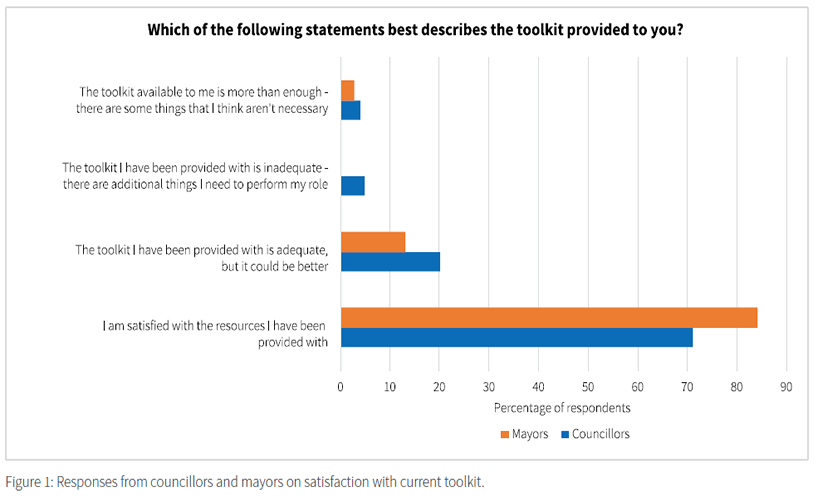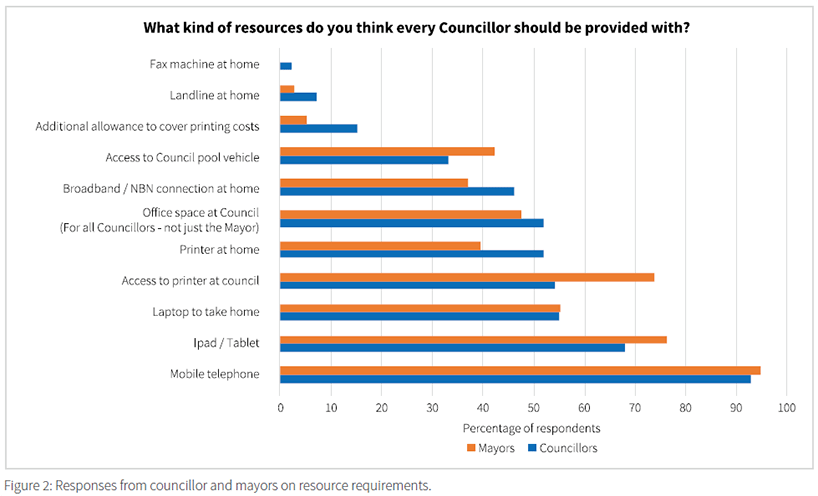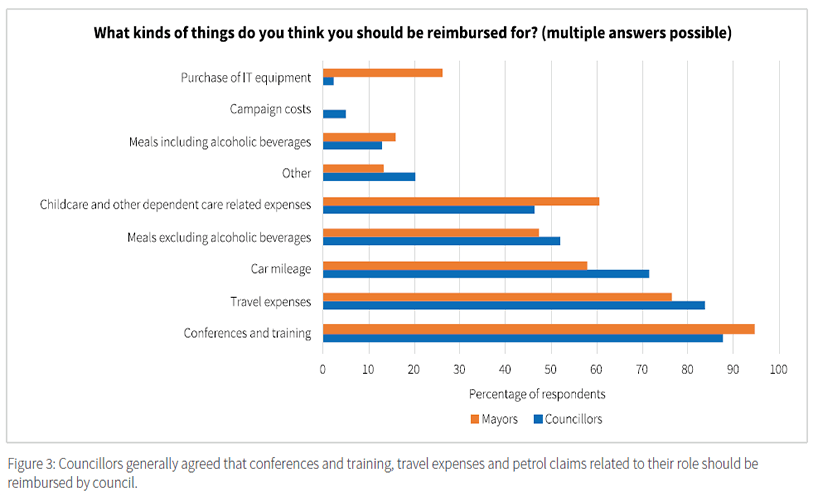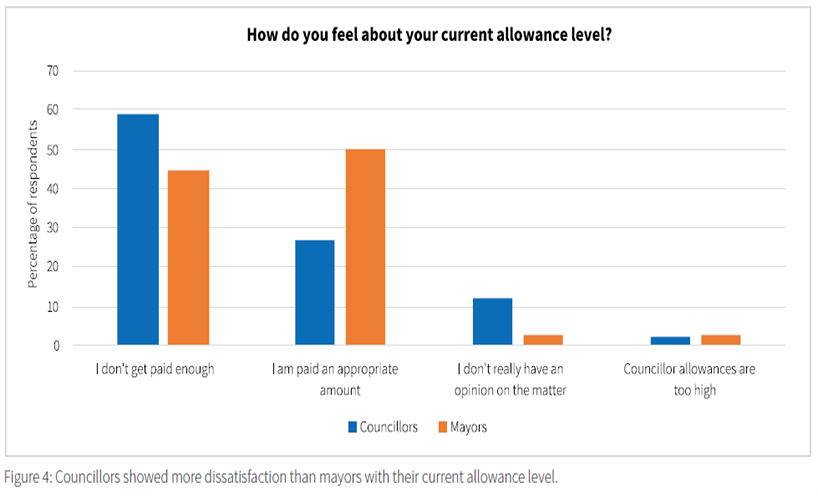Overview
The Local Government (Councillor Remuneration Review) Panel conducted a review and provided recommendations in 2008 regarding councillor allowances, reimbursement of expenses, and provision of resources and facilities to support mayors and councillors.
This culminated in a new policy published in April 2008 – ‘Recognition and Support: the Victorian Government’s Policy Statement of Local Government Mayoral and Councillor Allowances and Resources’, which included a recommended minimum ‘toolkit’ of resources and facilities for councillors.
As comprehensive guidance regarding councillor support was last issued in 2008, the Inspectorate sought to ascertain whether councillors are being adequately supported by way of the ‘toolkit’ of resources and facilities made available to them.
The 2008 guidance document17 recommended that a “minimum toolkit of support be provided for all Mayors and Councillors”. These included mandatory resources such as administrative support and an office and dedicated vehicle for the mayor; and a computer, mobile phone/landline, stationery, access to fax/copier, and development of councillor webpages as part of the council website.
Items that qualified for reimbursement included travel and public transport costs; phone usage and relevant call costs; internet, and childcare/family care.
Non-mandatory items or resources considered ‘as a matter for council determination’ included access to a pool car for councillors and office space and furniture.
The survey revealed the resources and facilities most commonly made available to councillors and mayors are a mobile telephone, access to a printer at council, an iPad or tablet and office space at council for councillors. Other more unique resources include administrative support for councillors, counselling, coaching and council-branded clothing. While councils have used the 2008 ‘minimum toolkit’ guidance as a starting point they have adapted it to be more contemporary and to meet the needs of their councillors.
Most councillors and mayors are satisfied with the resources and facilities provided to them, with 84% of mayors and 71% of councillors answering they are satisfied (figure 1).

However, the survey responses indicated that there are still additional resources/facilities that councillors and mayors think should be made available to them (figures 2 and 3). A common comment made by councillors was that they think they should have access to more administrative, secretarial or support staff, together with other staff to assist with tasks related to their duties such as research, answering technical questions, drafting and speech writing.

Governance staff indicated the task of meeting the different requirements and preferences of their councillors is often difficult. Councils in general would prefer to provide standardised equipment where possible but from time to time a councillor may request additional equipment. Relevant comments from the survey governance staff include:
"In essence we work with the councillors individually to meet their needs, we have found that one size does not fit them all and they all like to work in different ways"
"…resources differ between councillors, depending on requirements"

Councillors are expected to be aware of and comply with the conditions imposed on claims for childcare and dependent care in council expenses policies.
The Inspectorate investigated allegations that, over a seven-year period, a councillor at a metropolitan council filled out invoices on behalf of their babysitter in support of the councillor’s childcare expense claims. Many of these claims were alleged to be fraudulent.
Based on the available information, the Inspectorate concluded the councillor was not familiar with and/or did not adhere to council’s expenses reimbursement policy and did not have a good understanding of what constitutes appropriate documentation.
The councillor was given a warning and advised to submit only appropriate documentation in all future claims for reimbursement, which should include invoices or receipts signed or otherwise approved by the service provider.
This demonstrates the importance for councils to clearly stipulate in resources/expenses policies what is adequate supporting evidence for expenses reimbursement claims, including what evidence is sufficient for care claims.
It also illustrates the importance of training councillors on the resources/expenses policy to ensure they understand what they are entitled to and the requirements for obtaining reimbursement.
An allegation was received in early 2019 that a councillor from a large shire council was regularly attending functions and training opportunities in order to claim travel reimbursement, while using the
opportunity to go shopping instead of attending events.
This illustrates that councillors may be wasting council resources by electing to attend conferences, events or seminars to obtain travel reimbursements, and also that the general public are scrutinising use of resources by councillors.
Some council policies include a requirement to report verbally or in writing to council on conferences and training they have attended. All councils should consider adopting this position in their Expenses Policy.
Mayors and councillors receive an allowance for conducting their duties, dependent on their role, the council classification under Local Government Victoria guidelines and the decisions made by council on the specific allowance amount for each councillor. As well as the fixed allowance for the role of mayor and councillor, all Victorian councils provide reimbursement for expenses incurred as part of the role.
While most councillors and mayors are receiving an allowance at or near the top of the relevant range,18 the Inspectorate’s survey revealed a high proportion of discontentment with the amount of the allowance.19 From 179 councillor responses, 59% agreed with the statement ‘I do not get paid enough’ and 27% agreed with ‘I am paid an appropriate amount’. From the 38 mayors who responded, 50% agreed with the statement ‘I am paid an appropriate amount’ and 44% agreed with the statement ‘I do not get paid enough’ (figure 4).
“Councillors don’t get paid enough. I can’t afford not to work full time and do council, if I did reduce my hours to have a better work/life balance I would be sacrificing a career outside council.”
“Cr allowance adequate. Mayoral allowance also appropriate given the effort required of the Mayor”

The survey revealed differences in how councillors and mayors characterise their allowance (figure 5). The most common response amongst mayors was their allowance is a form of salary or wages, with 37% of respondents selecting this option. For councillors, the most common response was the allowance covers the costs relating to their role, including supplementing loss of employment costs (35% of respondents). Around a quarter of both mayors and councillors said their allowance represents recognition of the contributions they make as elected representatives.
This question asked ‘After the 2016 elections, at what level was your councillor/Mayoral allowance set?’ Accordingly, this does not take into account more recent changes in allowance levels
This question, ‘How do you feel about your current allowance level?’, was optional and not all respondents to the survey answered the question
Updated

